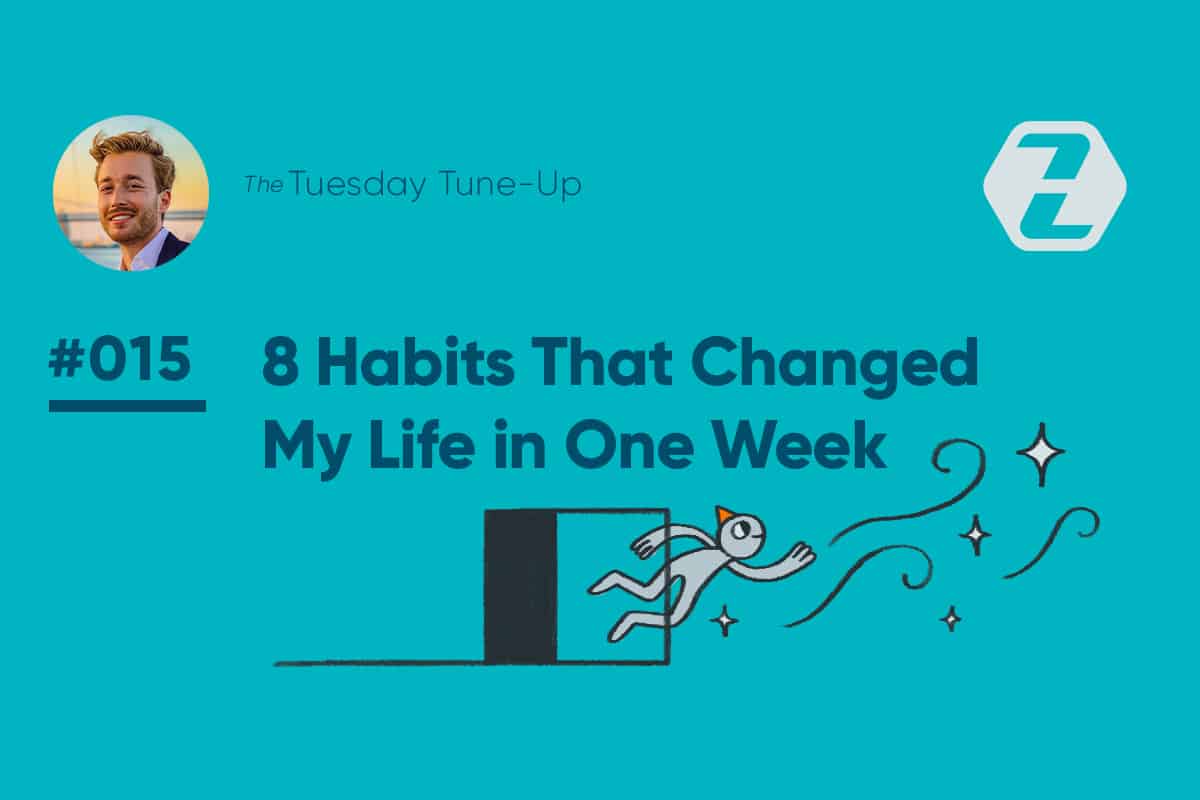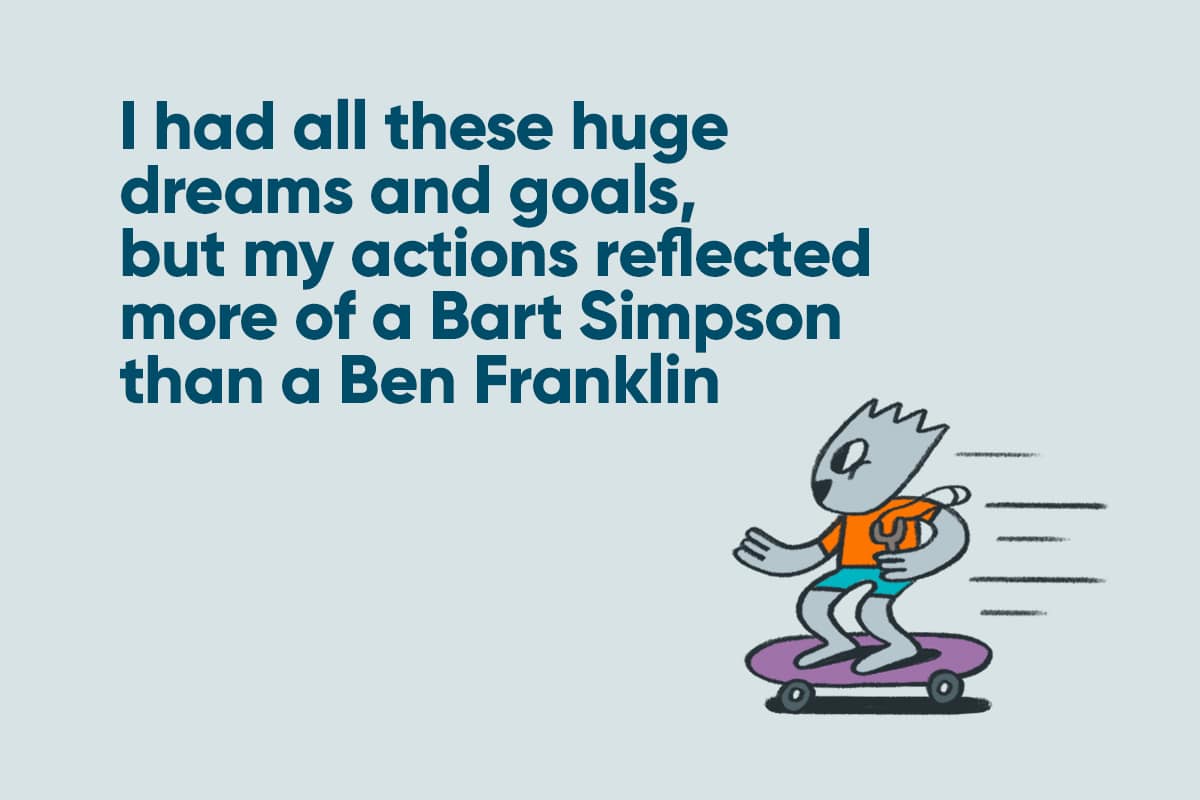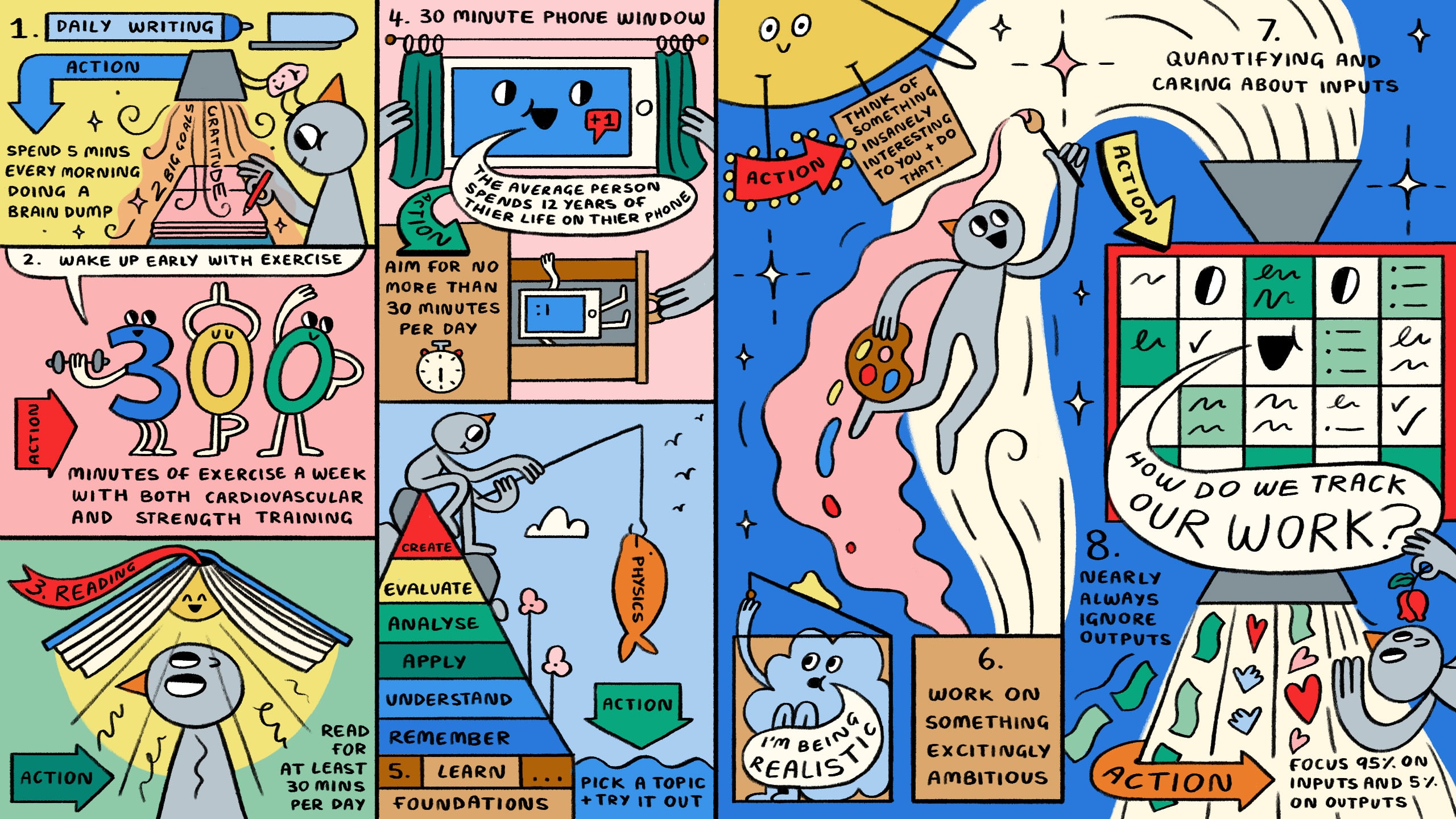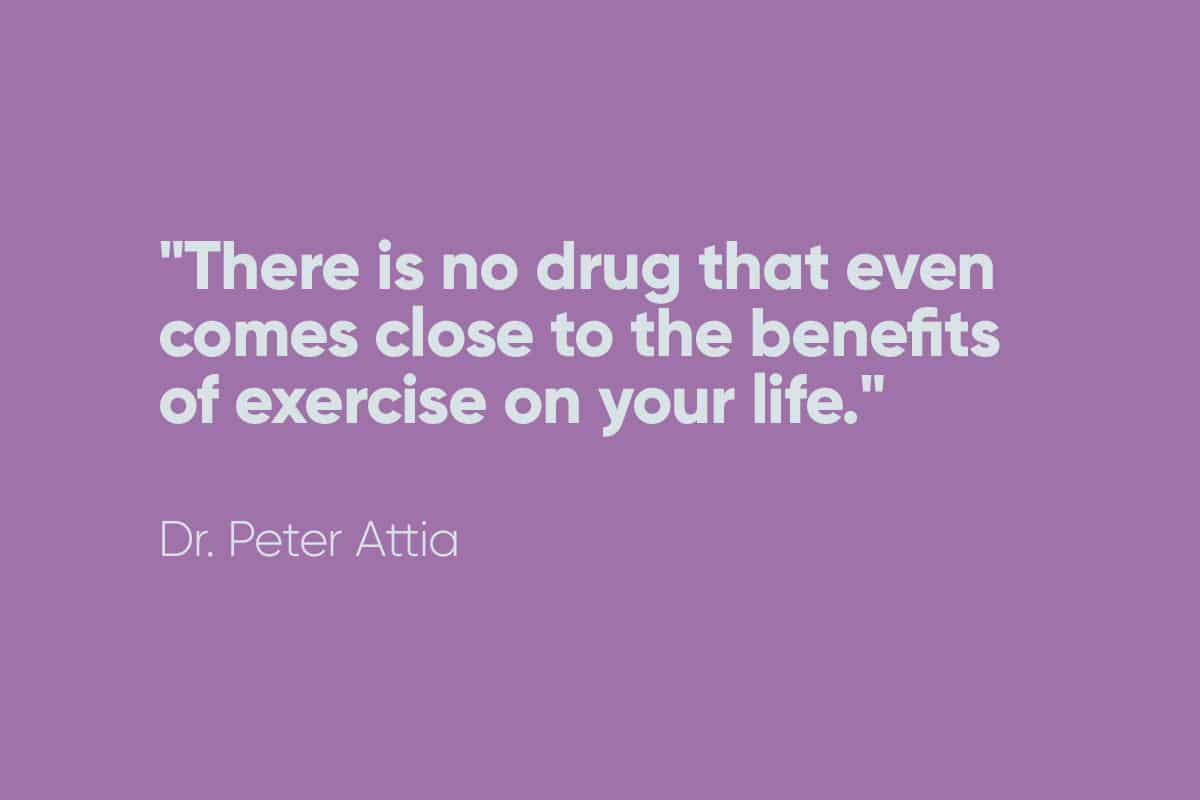
One week. That’s all it took for these 8 habits to change my life completely. I was stuck—tired, unmotivated, and going through the motions. I had all these huge dreams and goals, but my actions reflected more of a Bart Simpson than a Ben Franklin. Whether you’re struggling with energy, focus, or just feeling stuck, these habits transformed my productivity, mindset, and health, and they can do the same for you. Let me show you how to:

- Have more focus
- Have more energy
- Learn properly
- Have an impact

1. Daily Writing
Writing clarifies the day, removes junk from the brain, and is one of the best habits anyone can do.
- Ben Franklin set goals, reflected on personal virtues, or evaluated his progress every day
- Stephen King writes 2,000 words a day no matter what: “Amateurs sit and wait for inspiration, and the rest of us just get up and go to work.”
- Students that had a daily morning gratitude journal, literally just writing two things they were grateful for every morning had higher test scores, life satisfaction, and happiness.1
Take Action: Buy a lovely journal and pen and put in your calendar 5 minutes every morning to write in a journal one brain dump (whatever you are thinking about), two big goals for the day, and three things you are grateful for.
2. Waking up Early with Exercise
Trail running has changed my life for three reasons: nature, sunlight, and exercise. The benefits of exercise are so profound that I would encourage it above nearly anything else (other than sleep).
Challenging exercise in the morning makes me subjectively feel so much better for the rest of the day. Now, I often exercise again later in the day because I know how important exercise is, but if you can only find one time, the morning will work. Here’s some objective information:
- Regular exercise increases sleep quality by 65%2
- Exercise has a more significant impact on healthspan (quality of life) and lifespan (length of life) than anything else (other than emotional health), according to Dr. Peter Attia.
- A person who smokes has a 40% higher risk of all-cause mortality, that is, dying, compared to someone who doesn’t smoke. However, someone who has a 25-50th percentile VO2 max, a decent proxy for cardiovascular fitness, is at a 100% higher risk of all-cause mortality, or double the risk, than someone at the 75th-100th percentile in VO2 max. Poor cardiovascular fitness has a 2.5x greater relative risk than smoking.
- Someone in the bottom quartile is nearly 4x likelier to die than someone in the top quartile.
- And, according to this paper, even going from the bottom 25th percentile to the second 25th percentile (25th – 50th), cuts your risk of all-cause mortality in half.3
- Of course, there are confounders, but the magnitude is high, data is reproducible and consistent across many studies, dose-dependent response, great biological plausibility, and nearly all experimental data in humans show support for biological health, making this much more likely to be causal.
- Strength increase has nearly the same association. The stronger you are, the lower your risk of death. Peter Attia says, “There is no drug that even comes close to the benefits of exercise on your life.” One person even compared the two, exercise vs drugs, in cardiovascular disease, diabetes, and stroke, he found that exercise was either the same or better.4

After talking to your doctor and watching the videos below, try this for one week and see your life change.
Take Action: This is very hard to advise on, but I strongly recommend 300 minutes of exercise per week, including both cardiovascular and strength training. I would check out Peter Attia’s website or watch this video for specifics.
3. Reading for 2-hours
This quickly puts you in the top percentile of people. Most people read about 10 minutes per day.
I aim for 1-2 hours per day. Warren Buffet quintuples my reading at about 500-1000 pages a day.
In my whole life, I have known no wise people who didn’t read all the time — none, zero.
Charlie Munger
The superpower here is twofold:
- The act of reading builds focus, writing and speaking abilities, and brainpower.
- The content of reading builds more knowledge.
Take Action: Read anything that interests you for 30 minutes a day. My goal is two hours a day.
4. 30-Minute Phone Window
The average person spends 12 years on their phone. At four hours a day, that’s one full day (24 hours) per week of your face glued to some LEDs showing a teenager dance. Imagine what you could accomplish if you suddenly gained 24 hours during your week to do stuff? To read? To exercise? To learn how to code? To make your dreams come true?
If you reduce your screen time from about 3 hours and 30 minutes a day (a little below average) to 30 minutes a day, you’d find 21 hours every week or six extra years of life (at 30 years old). With those extra hours, I’ve written YouTube videos, learned some PHP programming, and gone on 3 hikes in one week.
Take Action: I’ve actually been able to cut my phone usage by 90% by only spending 15 minutes on my phone once a day. If you can, aim for no greater than 30 minutes. I put my phone down away from me and only look at it when an urgent call comes in (never) or from 4:00 – 4:15 PM every day.
5. Learn Foundations
The best students I have ever encountered learned the basics better than anyone. They understood better than everyone else. Then, they simply took the information they knew and transformed it to answer any question. There was very little memorization, just true understanding.
They could explain it to me with the brain of a 5-year-old, or an actual 5-year-old.
In school, you only need to know level 2 and level 3, maybe level 4. Learn the foundations really well, and the rest will be a breeze.
It’s impossible to move to the higher levels without level 2, and the greatest benefit comes from actually achieving level 3.
There are a few major topics to start to understand and then they can be applied to virtually anything, my favorite one is physics. However, some foundational texts can be very intimidating, so you might want to start with a beginner-friendly version and then move up. I’ll list examples of the foundational tombs that I would work towards and then more easily parsable books to start with:
Take Action: Which one of the above seems most interesting to you? Pick one topic from both books, and try it out!
6. Work on Something Excitingly Ambitious
Why is everyone so god-damn realistic? It’s just no fun.
The funny thing is, most people who say they are being “realistic” are putting themselves in a box.
When you want something, the whole universe conspires in order for you to achieve it.
The Alcehmist – Coelho
I feel like our odds of dreaming big dwindle as we age. Even at a young age, people are being told to be “realistic.”
This is a long quote from Paul Graham’s Do Great Work Essay but stick with me:
Develop a habit of working on your own projects. Don’t let “work” mean something other people tell you to do. If you do manage to do great work one day, it will probably be on a project of your own. It may be within some bigger project, but you’ll be driving your part of it.
What should your projects be? Whatever seems to you excitingly ambitious. As you grow older and your taste in projects evolves, exciting and important will converge. At 7 it may seem excitingly ambitious to build huge things out of Lego, then at 14 to teach yourself calculus, till at 21 you’re starting to explore unanswered questions in physics. But always preserve excitingness.
There’s a kind of excited curiosity that’s both the engine and the rudder of great work. It will not only drive you, but if you let it have its way, will also show you what to work on.
What are you excessively curious about — curious to a degree that would bore most other people? That’s what you’re looking for.
Once you’ve found something you’re excessively interested in, the next step is to learn enough about it to get you to one of the frontiers of knowledge. Knowledge expands fractally, and from a distance its edges look smooth, but once you learn enough to get close to one, they turn out to be full of gaps.
Paul Graham – Do Great Work
Isn’t it so amazing? I need to put it on my wall. The problem is, I can’t tell you what that thing is. Only you can. Where is the curiosity? I know it’s there, but maybe you have been stuffing it down for so many years, and it’s difficult to find.
For example, I’ve recently picked up programming, why? Well I don’t want to work as a software engineer, I want to build stuff. Solving challenging problems has always fascinated me. Initially it was video games and making money on ebay, then electrical engineering, then understanding the human body to help someone, then YouTube and storytelling, now it’s more YouTube but also building technical projects that excite me- all these thing seem unrelated but really they are! They are all things that I initially had no idea how to do, but I learned how to do it well over time and put the final “projects” into the world.
Again, I understand. You have a job, you have to go to school, and you have kids to take care of, but why can’t you spend 30 minutes to one hour on the commute learning about drawing, programming, or writing?
Marie Curie won a Nobel Prize in Physics and Chemistry for her work with radioactivity and chemistry while being a solo mother of two. Oh yeah, one of those daughters also went on to win a Nobel Prize.
Abraham Lincoln was born into extreme poverty, was depressed, lost his mother at nine years old, and his children died. However, he still was one of the most revered presidents in America ever, leading the country through the Civil War, ending slavery, and orating his famous Gettysburg Adress.
Take Action: Think of something so insanely exciting to you that you think you could spend the next 48 hours not moving, thinking about, and working on, and do that. Plan it. How will you change the world?
7. Quantifying and Caring About Inputs
If we built our vision above, how do we track our work?
How many hours did you exercise last week? What weight did you use at the gym? How many hours did you read? How many hours of sleep did you get last night?
I’m not saying you need to measure every single one of these. I’m saying you need to measure what’s important to you.
Napoleon famously invaded Russia in 1812 without measuring out provisions for his troops. He thought he didn’t need to measure it because he would win quickly. The Russian winter quickly devastated the troops because Napoleon didn’t take a second to quantify his actions, which led to a catastrophic military failure.
Maybe we aren’t invading a country, but I suffer constantly from my bravado. “Oh, it’ll be enough!” or “I’ll figure it out by then!” or “I have a good enough sense for this. I can eyeball it.” Just ask my family about the famous Thanksgiving Butternut Squash Soup Salt Disaster of 2016.
For example, this week, it’s very important that I do a certain amount of writing and coding, so I scheduled it in my calendar.
Then, at the end of the week, I give myself a percentage score based on how much of this work I got done, such as the coding I finished, the videos I recorded, and the essays I wrote.
At the end of the week, I’ll review my percentage with two friends who are also working on big goals. We will discuss what went well, what didn’t go well, and how we can improve.
In God we trust, all others must bring data.
W. Edwards Deming
What did I want to accomplish every day? Every week? What percentage of my goals did I hit? How am I measuring this?
Fix it: measure it so you can fix it.
8. Nearly Always Ignoring Outputs
Your goal might be a monetary amount, a certain number of followers, or relationship status, but focusing only on the outputs is a surefire way to be unhappy.
The equation for output to us is highly complicated, including genetics, environment, trends, whether an individual is happy or sad, and countless others.
Here’s the hard part: don’t worry about it.
The only thing you can affect is your input into the system. Focus on that.
My #1 goal is to make cool stuff and share it with people. That’s it.
What I’ve deleted/stopped focusing on:
- Views
- Likes
- Subs
- $ in Bank account
The caveat here is that occasionally, we want to check in in case we need to course correct or alter something in our business or personal life. For example, if I am trying to lose weight and I am actually adhering to all the inputs, but I am still gaining weight, I need to check on something. Does that food item have more calories than I thought? Is there something medical going on?
For my business, also, if I am selling something, I might stop if absolutely no one is buying it or people are saying it is really bad or faulty or something.
You are not entitled to the fruits of your labor, only to the labor itself.
Bhagavad Gita
Focus 95% on inputs, and 5% on outputs.
Fix it: Instead of being attached to some external motivators that can flip on a dime, what about me? What are my goals? What important stuff do I need to do?
Bonus: Going to Coffee Shops
If you can commit 2-3 hours a day for a year to deep work, your life will be changed. I promise.
Every other morning, I drive, walk, or bike to a coffee shop or library and commit 2 to 3 hours to work on my content or another side project. I buy a coffee—an iced latte when it’s hot and black coffee when it’s cold—sit in a corner, open my MacBook Air, pop in my AirPods on noise-canceling mode, hit play on a classical music playlist on Spotify, and often don’t move for three solid hours.
I am so magically effective in these 3 hours that even the fattest, stinkiest, most scary-looking frog looks like an ice cream sundae. It is no match for my 8-11 am super-sayan productivity superpowers.
Summary:
To change your life in one week:
- Write daily for 5 minutes
- Wake up early and exercise
- Read 30 mins a day
- Max your phone time at 30 minutes a day (usually means an extra 3 hours a day for the good stuff)
- Learn Foundations
- Work on something excitingly ambitious
- Quantify and care about inputs
- Nearly Always Ignore Outputs
- Bonus: work in coffee shops
Thanks for reading!
Work Cited
- Işık, Ş., Ergüner-Tekinalp, B. The Effects of Gratitude Journaling on Turkish First Year College Students’ College Adjustment, Life Satisfaction and Positive Affect. Int J Adv Counselling 39, 164–175 (2017). https://doi.org/10.1007/s10447-017-9289-8
- Reid KJ, Baron KG, Lu B, Naylor E, Wolfe L, Zee PC. Aerobic exercise improves self-reported sleep and quality of life in older adults with insomnia. Sleep Med. 2010 Oct;11(9):934-40. doi: 10.1016/j.sleep.2010.04.014. Epub 2010 Sep 1. PMID: 20813580; PMCID: PMC2992829.
- Mandsager K, Harb S, Cremer P, Phelan D, Nissen SE, Jaber W. Association of Cardiorespiratory Fitness With Long-term Mortality Among Adults Undergoing Exercise Treadmill Testing. JAMA Netw Open. 2018 Oct 5;1(6):e183605. doi: 10.1001/jamanetworkopen.2018.3605. PMID: 30646252; PMCID: PMC6324439.
- Naci H, Ioannidis JP. Comparative effectiveness of exercise and drug interventions on mortality outcomes: metaepidemiological study. Br J Sports Med. 2015 Nov;49(21):1414-22. doi: 10.1136/bjsports-2015-f5577rep. PMID: 26476429; PMCID: PMC4680125.

2 comments
Jessie R
Love these tips ! I’m trying to fine tune my morning routine and everyday living lol thanks for the inspiration.
Zach
Let me know how it goes! Or if you have any tips for me!